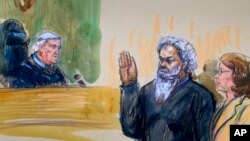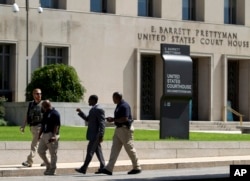A jury heard closing arguments Thursday in the federal government's case against Ahmed Abu Khatallah, who is accused of conspiring to organize the 2012 attack on a U.S. diplomatic compound in Benghazi, Libya, that killed U.S. Ambassador Christopher Stevens and three other Americans.
Khatallah, the first defendant to face criminal charges in connection with the Benghazi attack, is on trial for 18 counts, including murder and providing material support to terrorists. He has pleaded not guilty to all of the charges.
He was captured in 2014 by U.S. military and FBI officials in Libya and transported to the United States aboard a Navy vessel.
A second person alleged to be involved, Mustafa al-Imam, made his first court appearance earlier this month.
Khatallah is not accused of directly participating in the attack on the U.S. consulate or the nearby CIA annex. Rather, prosecutors say, he worked behind the scenes to help orchestrate the attack, making him a co-conspirator and organizer.
The government over the past several weeks has introduced evidence — such as phone records showing that the defendant made calls to his associates right before they were captured on grainy videos participating in the attack — and testimony from a variety of witnesses.
Paid to lure Khatallah
One witness who testified was a man identified by the pseudonym Ali Majrisi.
Majrisi was paid $7 million by the government to befriend Khatallah, gather evidence against him and eventually lure him to the place where he was captured by U.S. forces.
The jury at the trial in the U.S. District Court for the District of Columbia also heard emotional testimony from State Department and CIA officials, who spoke in detail about how Stevens and the other three Americans died.
"You have not heard that he lit the match," prosecutor Michael DiLorenzo said of Khatallah on Thursday. "You have not heard that he fired the mortars."
But he is "equally as guilty," he said, because a co-conspirator is liable for any crimes deemed to be a "reasonable, foreseeable consequence" of a conspiracy.
Khatallah's lawyer, Michelle Peterson, told jurors Thursday that the government was trying to play on their emotions to win a conviction, when in fact the evidence of the case did not prove her client's guilt. She suggested that the witnesses paid by the government with a "bag of cash" were not credible.
"They want you to hate him," she said. "Mr. Abu Khatallah is not guilty of these charges."






